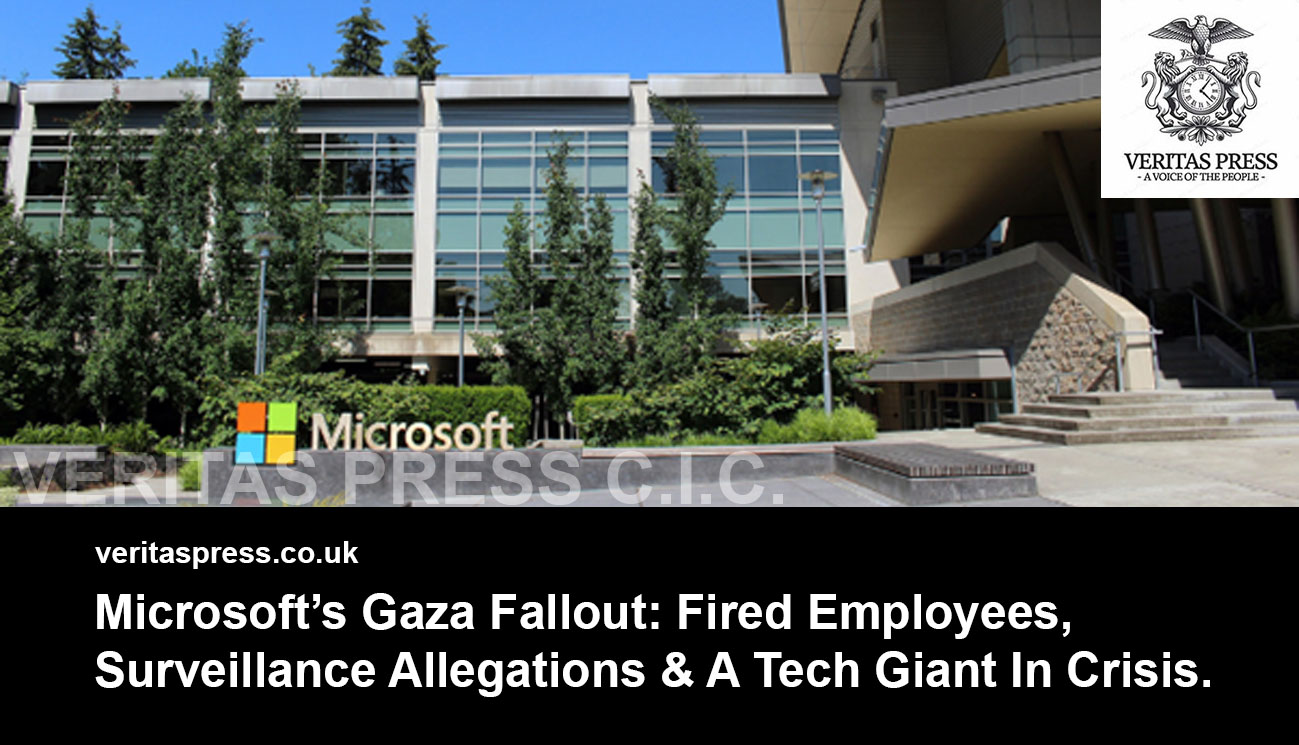Press Release: Veritas Press C.I.C. Author: Kamran Faqir Article Date Published: 28 Aug 2025 at 11:10 GMT Category: Americas | USA | Microsoft Source(s): Veritas Press C.I.C. | Multi News Agencies
Microsoft is under intense scrutiny after the firing of two employees, Anna Hattle and Riki Fameli, who staged a sit-in in President Brad Smith’s office to protest the company’s ties to Israel amid the Gaza war. Their dismissal has become a flashpoint in a broader conflict over corporate complicity, mass surveillance, and the ethics of Big Tech.
The Latest Flashpoint: Firings At The Sit-In.
On August 27, 2025, Microsoft terminated Hattle and Fameli, citing “serious breaches of company policies and our code of conduct” related to the “break-in” at executive offices. The pair joined a sit-in organised by No Azure for Apartheid, protesting Azure contracts with the Israeli government. Seven protesters, current and former employees, were arrested at Microsoft’s Redmond campus. Reports describe the sit-in as livestreamed on Twitch, forcibly broken up by police, and followed by a campus lockdown.
Azure And Unit 8200: Surveillance Infrastructure.
Journalistic investigations, including from The Guardian, +972 Magazine, and Local Call, revealed that Israel’s Unit 8200 has been using a customised segment of Microsoft’s Azure platform to store millions of Palestinians’ phone call recordings, enabling “a million calls an hour” of mass surveillance, guiding airstrikes and arrests. As of mid-2025, approximately 11,500 terabytes (~200 million hours of audio) were reportedly held on Azure servers in the Netherlands, Ireland, and possibly Israel.
Microsoft claims CEO Satya Nadella was unaware of the nature of the data stored and maintains that it found “no evidence to date” that its technologies were misused to harm people, including through a prior internal review.
Escalating Protests: Employee Activism Vs. Corporate Control.
Hattle and Fameli’s sit-in caps months of internal dissent:
- Early April 2025: Engineer Vaniya Agrawal, along with another activist, disrupted Microsoft’s 50th-anniversary event; both were fired days later.
- May 2025: An employee interrupted a speech by CEO Satya Nadella, also resulting in termination.
- August 21, 2025: 18 protesters arrested after establishing a “Liberated Zone” on campus, painting Microsoft signs red, and creating barricades in a plaza, part of the same “No Azure for Apartheid” movement.
- August 26–27, 2025: Sit-ins and arrests intensified; protesters were removed by force, some carried out in full-body harnesses.
Microsoft’s response included contacting the FBI and working with local law enforcement to monitor and suppress these protests, a move critics say is disproportionate and authoritarian.
Legal, Ethical & Financial Implications:
- Legal Risk: If found complicit in supporting surveillance used for war crimes, Microsoft could face litigation under international humanitarian law or ESG-focused shareholder lawsuits.
- Regulatory Scrutiny: Regulatory bodies and human rights groups may escalate inquiries into whether Microsoft’s partnerships breached its terms of service or international law.
- Financial Fallout: Activists report that over 1,500 employees have signed petitions, and shareholder pressure is mounting. Ongoing reputational damage could influence stock performance and investor confidence in Azure revenues tied to governmental contracts.
Broader Tech Trends & Silencing Dissent:
This episode reflects a growing crisis across the industry:
- Tech giants like Google and Amazon face similar backlash for government ties, such as Project Nimbus, highlighting employee resistance to military contracting.
- Companies are increasingly censoring internal discourse, restricting terms like “genocide” and silencing pro-Palestinian speech to maintain “inclusive” workplaces.
- For Muslim and activist employees, the usage of their work to facilitate what they deem genocide has triggered moral and spiritual crises.
The Humanitarian Backdrop:
Meanwhile, Gaza is in deep crisis. As of mid-August 2025, more than 100,000 Palestinians have been killed, with hunger-related deaths climbing, including among children. Humanitarian agencies like the UN and NGOs warn of famine and widespread destruction. These harrowing conditions underscore protesters’ claims that Microsoft’s technology has a direct, lethal impact on civilians.
What Comes Next:
- Will Microsoft release the Covington & Burling LLP report and other findings to prove transparency?
- Can internal and external pressure force the company to reassess contracts with military clients?
- Will this episode spark a sector-wide reckoning on ethics, employee rights, and corporate responsibility?
Conclusion – Big Tech’s Global Playbook Of Complicity.
Microsoft’s crackdown on dissent is not an isolated incident; it’s part of a larger corporate architecture of power. The company’s silence on Azure’s role in Israeli surveillance underscores a hard truth: for U.S. tech giants, human rights are negotiable when markets, military contracts, and resource access are at stake.
The refusal to publish the Covington & Burling review signals that transparency has become a liability, not a value. If Microsoft’s hands were clean, there would be no need for secrecy. Instead, the company’s choice mirrors a disturbing pattern: Big Tech enabling repression while shielding itself from scrutiny.
This pattern extends far beyond Palestine. U.S. tech corporations have a documented history of supporting authoritarian regimes in Africa, the Middle East, and Asia, from providing digital infrastructure for state surveillance to supplying AI systems for predictive policing, all in exchange for control over markets and access to critical minerals like cobalt, lithium, and rare earths. These partnerships prop up governments accused of mass killings, political repression, and even genocide, under the banner of “stability” and “development.” In reality, it’s about extractive dominance and geopolitical leverage.
By embedding themselves in the machinery of occupation, dictatorship, and exploitation, companies like Microsoft, Google, and Amazon are not neutral actors; they are active collaborators in systems of dispossession and violence. They sanitise their complicity with buzzwords like innovation, inclusion, and AI for Good, while fortifying fascist regimes that crush dissent and strip nations of sovereignty.
The question is no longer about compliance with a corporate code of ethics. It is about whether Big Tech has become a global subcontractor for war and resource plunder, where the lines between Silicon Valley and the military-industrial complex no longer exist. If left unchecked, the future will not be one of liberation through technology, but of digital colonialism, where code enforces control, and algorithms decide who lives and who dies.
Tags:




























Leave a Reply